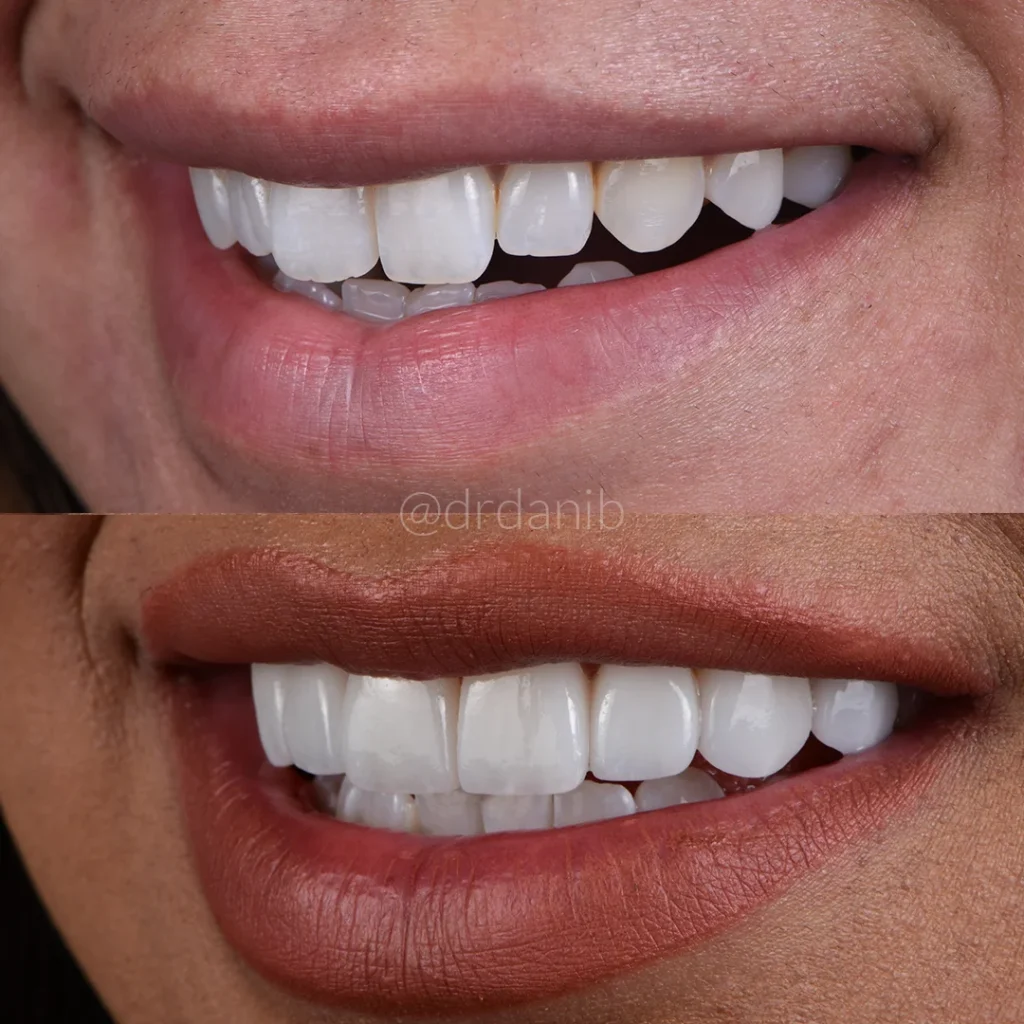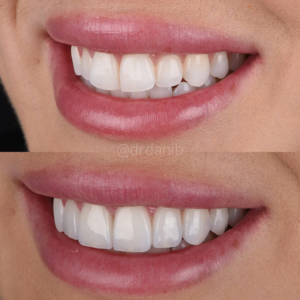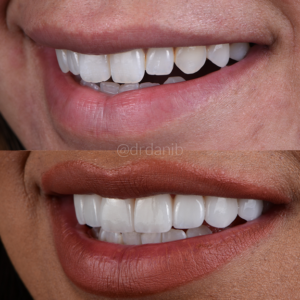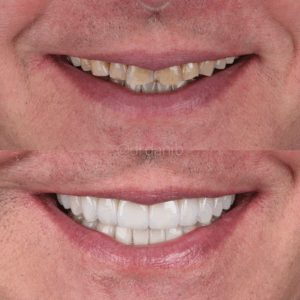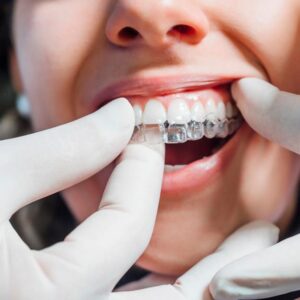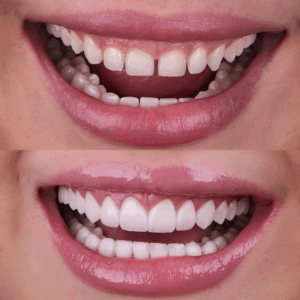It happens more often than you think. You’re eating, you’re playing sports, or maybe a cavity just got out of control. Suddenly, you have a missing tooth. It might not seem like a big deal at first, especially if it’s a back molar that nobody can see. But that empty space in your smile is more than just a cosmetic concern, it’s a ticking time bomb for your oral health.
According to the American College of Prosthodontists, about 178 million adults in the U.S. are missing at least one tooth. While this is a very common issue, the real problem lies in the consequences of not addressing it. When you have a missing tooth, your body immediately begins to react to the change, kicking off a series of events that can affect your entire mouth and even your overall health.
Fortunately, Dr. Dani B. offers a powerful and permanent solution: dental implants. They are the gold standard for tooth replacement, designed to mimic the function and feel of a natural tooth. But before we get into how implants can help, let’s explore what truly happens when you leave a missing tooth untreated.
The Immediate and Long-Term Effects of a Missing Tooth
When you lose a tooth, your body responds with a domino effect of negative changes that can affect your bite, your jawbone, and even your appearance.
The Shifting of Adjacent Teeth
When a tooth is removed, the teeth on either side of the gap lose the support they once had. Over time, these neighboring teeth start to drift and shift into the empty space. This movement can throw off your entire bite alignment, leading to a number of problems. Your teeth can become crooked or crowded, which not only affects your smile but also makes them much harder to clean, increasing your risk of cavities and gum disease.
Bone Loss in the Jaw
This is one of the most serious and often overlooked consequences of a missing tooth. The roots of your teeth play an important role in stimulating the jawbone. Every time you bite and chew, that pressure is transferred through your teeth to your jawbone, signaling the bone to maintain its density and strength. When a tooth is gone, that stimulation stops.
Without a tooth root, the jawbone in that area begins to deteriorate, a process known as bone resorption. In just the first year after a tooth is lost, the jawbone can lose up to 25% of its width, and the loss continues to get worse over time. This can lead to a sunken, aged facial appearance, as the jawbone provides the foundational support for your cheeks and lips.
Gum Health Issues
An empty socket is an open invitation for bacteria. The gap created by a missing tooth is a perfect place for food particles to get stuck, creating a breeding ground for plaque and bacteria. This puts you at a higher risk for developing gingivitis and more severe gum disease (periodontitis). These infections can not only harm the rest of your teeth and gums but can also contribute to other systemic health problems.
Chewing and Digestion Problems
You might instinctively start chewing on the other side of your mouth to avoid the gap. This can put a strain on your temporomandibular joint (TMJ), leading to jaw pain, headaches, and an unbalanced bite. More importantly, when you can’t chew your food properly, your body struggles to digest it, potentially affecting your nutrition and overall health.
Speech Difficulties
Your teeth, tongue, and lips all work together to form words. A missing tooth, especially one in the front, can affect your ability to pronounce certain sounds, like “s” and “f,” leading to a lisp or other speech impediments. This can be a source of frustration and embarrassment.
Aesthetic and Confidence Impact
Let’s be honest: a missing tooth can make you feel self-conscious. You might try to hide your smile or avoid social situations altogether. The psychological toll of a missing tooth can be significant, affecting your self-esteem and confidence over time.
Also Read: What If You’re Missing Multiple Teeth? Dental Implant Options to Consider
Why Dental Implants Are the Most Effective Solution
Unlike other options that just sit on top of the gums, a dental implant is designed to be a permanent part of your mouth.
What Is a Dental Implant?
A dental implant is a small, screw-shaped post made of a biocompatible material, usually titanium. This post is surgically placed into your jawbone, where it acts as a replacement for the tooth’s root. Over a few months, the implant fuses with the bone in a process called osseointegration. This creates a strong, stable foundation for a custom-made crown, which looks and functions just like your natural tooth.
The Benefits of Dental Implants
- Prevents Bone Loss: This is the most important benefit. The implant post acts like a natural tooth root, providing the necessary stimulation to the jawbone. By maintaining bone density, implants preserve your facial structure and prevent that premature, sunken look.
- Keeps Surrounding Teeth Stable: Since the implant fills the empty space, it prevents your adjacent teeth from shifting. This keeps your bite aligned and your smile healthy.
- Restores Full Functionality: With a dental implant, you can bite, chew, and speak just as you would with a natural tooth. There are no dietary restrictions, so you can enjoy all your favorite foods again.
- Improves Oral Health: Implants are easy to clean and maintain, just like your natural teeth. They don’t require you to grind down healthy adjacent teeth, a common requirement for bridges. This helps to protect your overall oral health.
- Aesthetic Advantage: A custom-made crown is created to match the color, shape, and size of your other teeth, blending seamlessly into your smile. Nobody will ever know you have an implant.
Dental Implants vs. Other Tooth Replacement Options
Implants vs. Bridges
A traditional dental bridge requires grinding down the healthy teeth on either side of the gap to serve as anchors. This compromises the long-term health of those teeth. Bridges also don’t prevent bone loss underneath, and they typically need to be replaced every 5-15 years. Dental implants, on the other hand, are a long-term solution that can last a lifetime with proper care, and they protect your other teeth.
Implants vs. Dentures
Full or partial dentures are removable and rest on the gums. They can be uncomfortable, slip while you talk or eat, and require the use of messy adhesives. They also don’t stop bone loss, which means they will eventually need to be refitted as your jawbone changes. Implants are permanent and feel completely natural.
When to Consider a Dental Implant
The sooner you address a missing tooth, the better. When a tooth is lost, bone loss begins immediately, so acting quickly can simplify the implant process. To be a candidate for an implant, you need to have a sufficient amount of healthy bone to support the implant post. If you’ve already experienced significant bone loss, there’s still hope. Modern techniques like bone grafting can restore the bone, making implant placement possible.
Also Read: Missing Teeth? Discover Why Dental Implants Are the Best Long-Term Solution
What to Expect During the Dental Implant Process
The process typically involves a few key stages:
- Initial Consultation: Your specialist will perform a thorough examination, including 3D imaging, to assess your bone health and plan the implant placement.
- Implant Placement: A minor surgical procedure places the titanium post into the jawbone.
- Healing and Osseointegration: This is the most important part of the process, where the implant fuses with your jawbone. This period usually takes a few months.
- Crown Placement: Once the implant is fully integrated, a connector (abutment) is attached, and your custom crown is placed on top.
Conclusion and Next Steps
A missing tooth is much more than a gap in your smile. It’s a serious health issue that can lead to shifting teeth, bone loss, and a decrease in your quality of life. While other options exist, dental implants stand out as the most durable, functional, and health-conscious solution available today. They not only restore your smile but also preserve your oral health and facial structure for years to come.
If you have a missing tooth, don’t wait. The long-term consequences of inaction are significant. Taking the first step toward a healthier, more confident smile is as simple as scheduling a consultation with Dr. Dani B. He can help you determine the best path forward and answer any questions you may have about the process.


